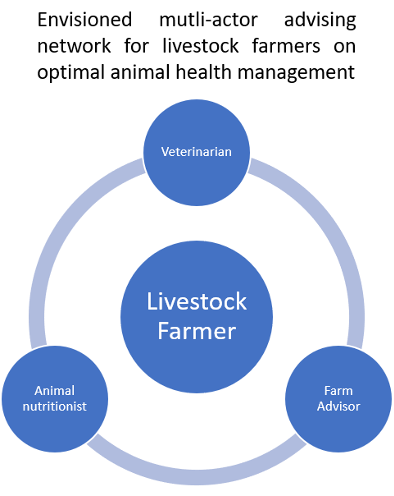Enhancing animal health & welfare
The role of animal nutrition to reduce the need for antibiotics use at farm level and to support animal welfare should be acknowledged by a legal framework and encouraged by public research stimulating innovation.
Antimicrobial Resistance (AMR) is of high societal and political importance due to its significant impacts on human and animal well-being. FEFAC supports the “One health” strategy of the EU and participates strongly in initiatives aiming at reducing the use of antibiotics in livestock and companion animals along the principle “as much as needed, as little as possible”. In this sense, FEFAC is an active member of the European Platform for the Responsible Use of Medicines in Animals (EPRUMA).
It shouldn’t be forgotten that, ever since the EU ban of the use of antibiotics for growth promoting purposes in 2006, it has consequently been prohibited for standard feed to contain any antibiotic growth promoters. Nevertheless, further reductions in the need for antibiotics for animal health purposes must be a key objective for the EU livestock chain. Provision of safe feed is, together with controlled farm housing conditions and hygiene practice, a prerequisite that contributes already to this minimization.
However, recent research indicates that nutrition is more than just meeting animals minimum requirements in nutrients to make them grow more and at a faster rate: nutrition is interlinked with the animal’s microbiome, gut and immune function. Animal health and well-being (and as a result animal performance) is therefore always related to a proper balance of those three domains. This new paradigm, often referred to as ‘eubiosis’, implies that no intervention can be effective without attempting to understand the interactions between them.
Both EFSA in its RONAFA report from 2016 and the European Commission in its action plan recognise that the interaction of nutritionally-balanced feed with the gut is a key factor for animal health and can, therefore, impact the need for veterinary treatment with antibiotics. In 2021, FAO published in its report on Animal nutrition strategies and options to reduce the use of antimicrobials in animal production, an inventory of nutrition solutions that could be implemented on the farm. Though the veterinarian should always remain the primary advisor assisting livestock farmers in the design of their farm health management, FEFAC argues for the systematic use of animal nutrition expertise. EU Member States should include the role of animal nutrition in their national AMR action plans on preventive measures. A more ambitious legal framework is necessary:
- to stimulate the placing on the market of feed additives helping animals to cope with pathogens;
- to allow feed operators to communicate to livestock farmers the added value of certain feeding strategies or formulations, based on scientific evidence, regarding the benefits in terms of animal health & welfare.
Animal behaviour is largely determined by genetics and housing, but feed can also have a positive impact. Animal welfare challenges, such as tail-biting in pigs and the pecking in chickens are problems that can arise for livestock farmers. Research into the development of new feeding strategies is ongoing to tackle these issues. FEFAC brings, for example, its expertise as an adviser to EU authorities concerning feeding strategies to mitigate the impact of the non-castration of piglets as a member of the Advisory Group of the EU Reference center for the Welfare of Pigs (EURCAW-Pigs).
